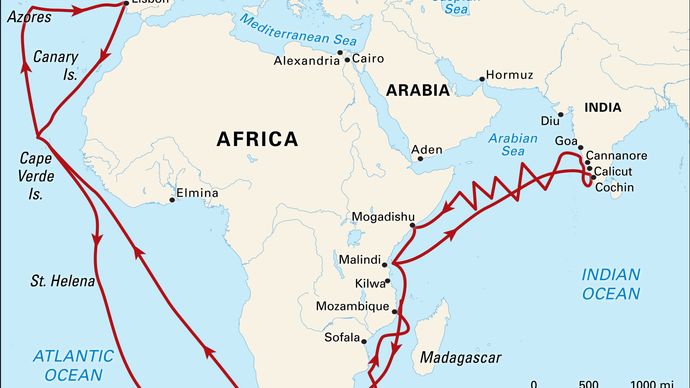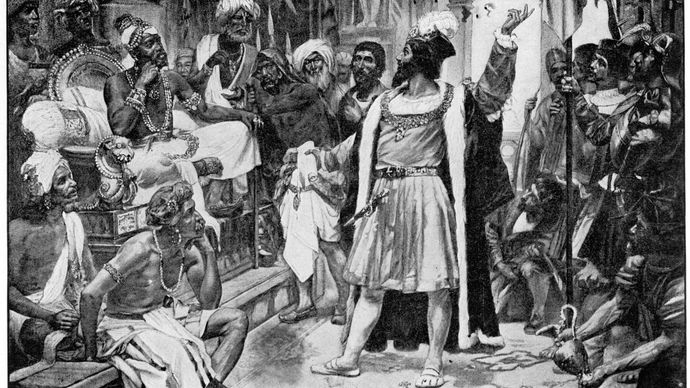Va-xco đơ ga-ma
Bạn đang xem: Va-xco đơ ga-ma
Corrections? Updates? Omissions? Let us know if you have suggestions to improve this article (requires login).
Feedback TypeSelect a type (Required)Factual CorrectionSpelling/Grammar CorrectionLink CorrectionAdditional InformationOther
Our editors will review what you’ve submitted and determine whether to revise the article.
Join letspro.edu.vn"s Publishing Partner Program and our community of experts to gain a global audience for your work!
Passing the Canary Islands on July 15, the fleet reached São Tiago (Santiago) in the Cape Verde Islands on the 26th, remaining there until August 3. Then, to avoid the currents of the Gulf of Guinea, da Gama undertook a long detour through the South Atlantic before attempting to round the Cape of Good Hope. The fleet reached Santa Helena Bay (in modern South Africa) on November 7. Unfavourable winds and the adverse current delayed the rounding of the Cape of Good Hope until November 22. Three days later da Gama anchored in Mossel Bay, erected a padrão on an island, and ordered the storeship to be broken up. Sailing again on December 8, the fleet reached the coast of Natal on Christmas Day. On January 11, 1498, it anchored for five days near the mouth of a small river between Natal and Mozambique, which they called the Rio do Cobre (Copper River). On January 25, in what is now Mozambique, they reached the Quelimane River, which they called the Rio dos Bons Sinais (the River of Good Omens), and erected another padrão. By this time many of the crews were sick with scurvy; the expedition rested a month while the ships were repaired.
Xem thêm: Cáp Chuyển Từ Vga Sang Hdmi (Có Âm Thanh + Dây Cáp Micro Usb)
On March 2 the fleet reached the Island of Mozambique, the inhabitants of which believed the Portuguese to be Muslims like themselves. Da Gama learned that they traded with Arab merchants and that four Arab vessels laden with gold, jewels, silver, and spices were then in port; he was also told that Prester John, the long-sought Christian ruler, lived in the interior but held many coastal cities. The Sultan of Mozambique supplied da Gama with two pilots, one of whom deserted when he discovered that the Portuguese were Christians.
The expedition reached Mombasa (now in Kenya) on April 7 and dropped anchor at Malindi (also now in Kenya) on April 14, where a Gujarati pilot who knew the route to Calicut, on the southwest coast of India, was taken aboard. After a 23-day run across the Indian Ocean, the Ghats Mountains of India were sighted, and Calicut was reached on May 20. There da Gama erected a padrão to prove he had reached India. The welcome of the Zamorin, the Hindu ruler, of Calicut (then the most important trading centre of southern India), was dispelled by da Gama’s insignificant gifts and rude behaviour. Da Gama failed to conclude a treaty—partly because of the hostility of Muslim merchants and partly because the trumpery presents and cheap trade goods that he had brought, while suited to the West African trade, were hardly in demand in India. The Portuguese had mistakenly believed the Hindus to be Christians.

Vasco da Gama
Vasco da Gama delivering the letter of King Manuel I of Portugal to the Zamorin of Calicut, India.
John D. Morris & Company/Library of Congress, Washington, D.C. (file no. LC-USZ62-105882)
After tension increased, da Gama left at the end of August, taking with him five or six Hindus so that King Manuel might learn about their customs. Ignorance and indifference to local knowledge had led da Gama to choose the worst possible time of year for his departure, and he had to sail against the monsoon. He visited Anjidiv Island (near Goa) before sailing for Malindi, which he reached on January 8, 1499, after nearly three months crossing the Arabian Sea. Many of the crew died of scurvy. At Malindi, because of greatly reduced numbers, da Gama ordered the “São Rafael” to be burned; there he also erected a padrão. Mozambique, where he set up his last padrão, was reached on February 1. On March 20 the “São Gabriel” and “Berrio” rounded the Cape together but a month later were parted by a storm; the “Berrio” reached the Tagus River in Portugal on July 10. Da Gama, in the “São Gabriel,” continued to Terceira Island in the Azores, whence he is said to have dispatched his flagship to Lisbon. He himself reached Lisbon on September 9 and made his triumphal entry nine days later, spending the interval mourning his brother Paulo, who had died on Terceira. (Out of da Gama’s original crew of 170, only 55 men had survived.) Manuel I granted da Gama the title of dom, an annual pension of 1,000 cruzados, and estates.











